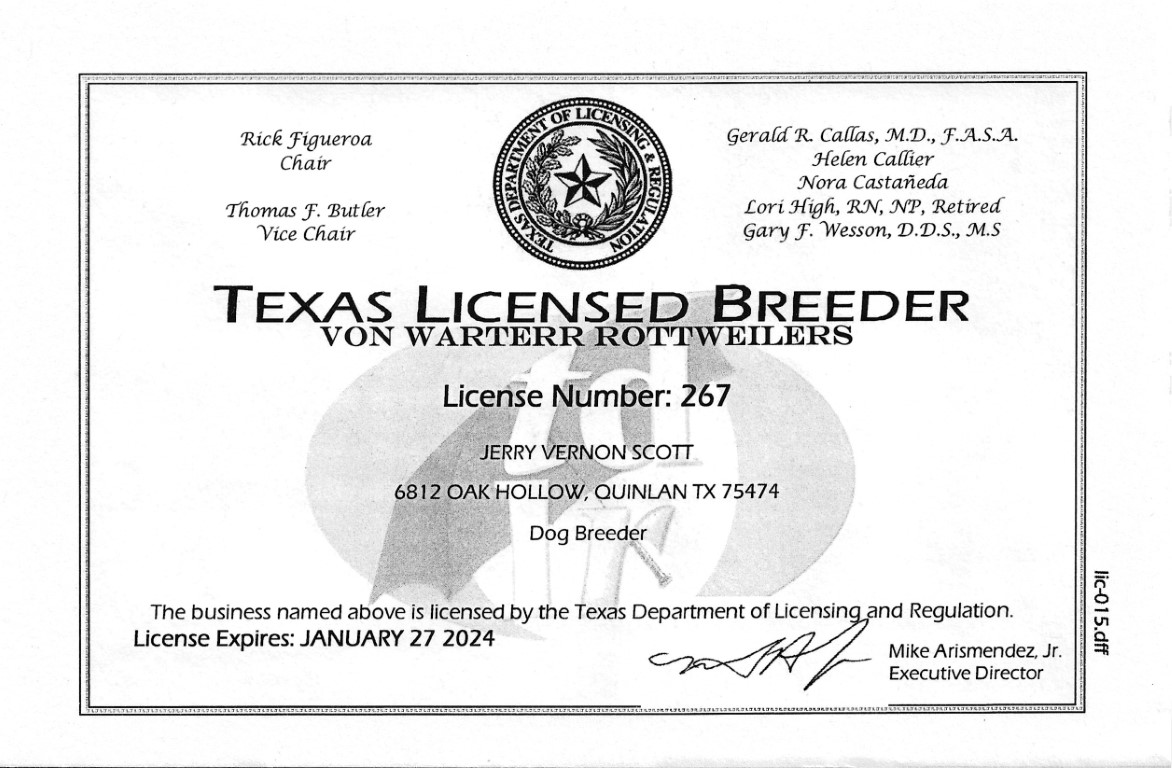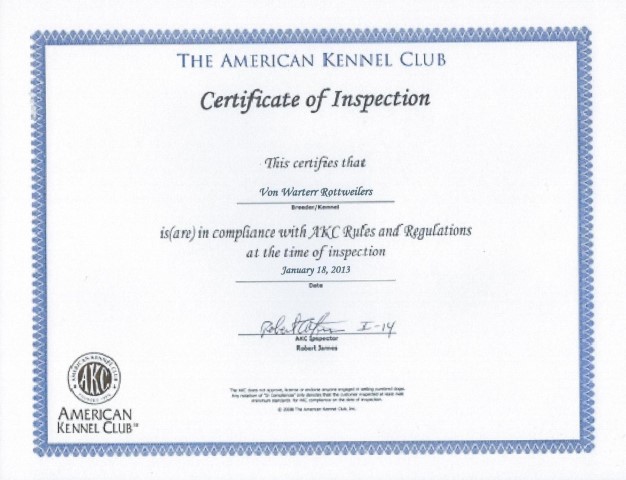Article 9 - Choosing a Vet: Are They All The Same?
Posted on April 7th, 2015
Article 10 - Choosing a Vet - Are they all the Same - Part 2
When you purchase a new puppy and bring it home, it ought to be in perfect health. A puppy who is in prime condition has been born and raised in a clean environment with good nutrition, proper exercise, and current vaccines and dewormings. It is now your responsibility to maintain its good health. You need to continue to provide an environment that is conducive to healthy growth. You must provide a nutritious diet, appropriate exercise, lots of love, and high quality medical care. It is essential that you and a professional veterinarian form a close working relationship in order to maximize your dog's health care. You and your vet of choice must perform as a team. You will need to trust one another's abilities and observations so that your pup can receive the best possible medical treatment.
A dog is man's best friend and you are your dog's best friend. A competent veterinarian is your dog's second best friend! Therefore you must carefully choose a great vet for your pup. When choosing a vet, you want more than just someone who is knowledgeable about veterinary medicine. You want someone who can meet both your needs and your pup's needs. A great vet possesses both people skills and animal skills. The worst time to be looking for a great vet is when you need one immediately. Establish who your pet's vet will be prior to needing his or her services. The best way to start your search for a vet is to ask for recommendations. Compile your list of recommended vets from family members, friends, neighbors, dog trainers, groomers, and boarding facilities. Veterinary schools can also refer you to alumni who have established practices in your area. If you purchased your pup from a local breeder, then they will probably be your best source of information. Some vets work better with certain breeds or species than others. Some vets are not as comfortable treating a large working breed like the Rottweiler. Ask prospective vets how many Rottweilers they treat in their clinic. Some vets refuse to do certain procedures such as ear cropping, tail docking, and dewclaw removal, so make sure they can perform the tasks you may need.
After you have made your list of possibilities, it is time to start doing your homework. Check if they are members of the American Animal Hospital Association (AAHA). AAHA membership indicates that they have voluntarily pursued and met certain standards in regards to their facilities, equipment, and quality of care. These vet hospitals submit a detailed report of their facilities, equipment, and services offered, and then are inspected by a consultant to ensure that they meet the established standards.
You will need to decide if you want a small veterinary office versus a larger clinic or hospital. Many people have a perception that you can get more of a "personal touch" from a small ractice. That may or may not be the case, but keep in mind that a larger practice will usually have the resources to employ a team of professional medical experts and also tend to have more and better equipment available. They will also be able to offer a wider range of services. I think it is best to have your pet see the same vet each time he goes for treatment so that a bond of trust and familiarity can be established. However, it is an added advantage if there is a panel of doctors working at the establishment for consultation on cases. If you decide to go with a smaller operation, be sure to find out what their policies and procedures are for emergency medical care, because eventually you will need medical attention for your pet after regular office hours. Location is not your primary concern when choosing a vet, but it is an important factor to keep in mind. You don't want to sacrifice quality care, but you do want quick access to your vet. If you have to drive across town with a sick or injured dog, the amount of time it takes to get those trained hands on your dog may make the difference between life and death.
Ask if a potential vet has an in-house lab and diagnostic facilities for tests such as ultrasounds, EKG, and endoscopy, or if those tests have to be outsourced. This makes a difference in the amount of time it takes to get test results and it can drive up costs. Also ask whether or not they accept pet medical insurance or have any form of financing large medical bills that can sometimes occur with surgery or emergency services. Check with the Veterinary Medical Board to find out if there are complaints against this particular veterinarian. If it is a large practice that has been in business for a long time, then it understandable that there may be a few registered complaints.
We concluded our last article with the recommendation that you check with the Veterinary Medical Board to find out if there are complaints registered against a veterinarian you may be considering. If it is a large practice that has been in business for a long time, it is understandable that there may be a few registered complaints. After all, we are pretty particular about our pets and sometimes we may even be unreasonable. However, there should not be an abundance of complaints filed by previous customers. An important thing to remember is that many veterinarians are the equivalent to general practitioners in human medicine. They may limit their practices to small animals such as dogs and cats, but will cover a wide range of services including annual physicals, vaccinations, diagnosis and treatment of common health issues, x-rays, and routine surgeries like spaying and neutering. It is important to know what your frequent needs will involve. If you are a breeder, you may want a vet who is a specialist in reproduction. If your dogs have skin allergies, then you need a specialist in dermatology. Your dog may have health problems that would benefit from a certified specialist in orthopedics. It could be an advantage to select a larger clinic or hospital that has a large panel of specialists in house.
Once you have narrowed your recommended list down to a handful, it is now time to visit these vet establishments. It is a good idea to bring your dog along so you can have a "meet and greet" time with the vet and his staff. It will help your dog to have positive first impressions of a friendly and pain-free encounter at the vet. Trust me-they remember the sights, sounds, and smells of a negative experience. When you visit, ask to see the overnight boarding facilities and the place where they keep animals who are hospitalized for extended treatment. These areas should be separated from one another. It is also best if canine and feline housing is separate. These housing areas should be clean and set up to avoid cross-contamination by urine and feces. Ask if there is a staff member present 24 hours a day for when your pet is required to stay overnight for treatment. Ask about policy and procedure for daily exercise. As a Rottweiler owner, it is also important for you to verify that all hospital staffers understand the tendency for this breed to be animal aggressive, and that proper precautions are taken by all who handle your dogs not to allow them to come into contact with other dogs, especially those of the same gender.
Once you have chosen a vet, begin building a good working relationship. You will want to provide the vet with your pet's medical history. You will usually be asked to complete a form that will be kept on file. It is important to provide full and accurate information. This data will help the vet measure your pet's growth and future health. It is not only important that the vet be good at his job, but you as the owner must also be good at your job. When you schedule an appointment, make sure you are on time. Tardiness puts the rest of the day's office schedule behind. That is rude and very frustrating to the medical staff. Bring your pet to the vet at the first signs of sickness. Do not delay and complicate matters. It is tragic when an animal dies from an illness that could have been treated successfully if professional treatment had just begun sooner. In serious health matters, do not be embarrassed to ask to get a second opinion. Your pet is worth it and they depend upon you to get them the best possible treatment. If at any point you are not satisfied with the care your pet is receiving, talk courteously but frankly with the vet about your concerns. If, after your communications, you still do not feel comfortable with the situation then by all means switch to a different vet. If you have problems concerning a treatment dispute or cannot resolve matters regarding what you believe to be unwarranted fees, then you may contact the ethics and grievance committee of your local or state veterinary association and/or the American Veterinary Medical Association. For serious issues of medical competence, you may file a formal complaint with the Veterinary Licensing Board in your state. Most people will never have to go to these extremes. You will find that most veterinarians are extremely qualified in their field and have a great love for animals. Just do a little research and you will find that special one with whom you can form a team for the good of your dog's lifelong health.


